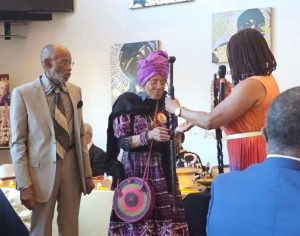The Georgetown University Reconciliation Fund, which awards grants to organizations supporting individuals and communities descended from the people enslaved by Georgetown and Maryland Jesuit plantations, awarded a total of $200,000 to seven community-based descendant organizations and projects Oct. 15.
The grants focus on community-based projects that celebrate and honor enslaved ancestors while supporting education and empowerment efforts to uplift the next generation. They represent the second of two annual installments, totalling $400,000, which the Reconciliation Fund has allocated to support the descendant community.
Robin Proudie — who leads grant recipient Descendants of the St. Louis University Enslaved (DSLUE), a nonprofit honoring those enslaved by St. Louis University, a Jesuit school whose enslaved workers came from Georgetown — said she wanted to honor her ancestors with the grant.
“This is for our ancestors,” Proudie told The Hoya. “We realized a lot of people don’t know this history, so we decided to tell our story and educate the wider community. And when I start talking about it, people are fascinated.”
Proudie said her grant will support headstones for unmarked graves, a film project documenting ancestors’ lives and contributions to a mentorship program for younger community members and an annual community event celebrating ancestors and elders.
“When we got the grant, it just elevated it to a whole other level so that we can really honor our elders who are here — give them their flowers now,” Proudie said. “I wanted to restore the rites of passage by having the younger generation see us honor our elders. It was amazing.”

Alongside DSLUE, grant winners included three descendants teaching students in Maryland schools about ancestors’ stories through art; a documentary called “Finding Us” about descendants tracing their heritage; a documentary called “The Poppaw Queen” about ancestor Mary Queen’s legal efforts for freedom throughout the 18th century; and the White Marsh Historical Society, which honors enslaved people at the Jesuit-owned White Marsh Plantation.
Two Louisiana-based projects also won grants: St. Mary’s Academy, a 156-year-old Catholic girls’ middle and high school in New Orleans which Henriette DeLille, a free Black woman, founded; and a project collecting oral histories from descendants and restoring gravestones in Ascension Parish, Louisiana.
Pamela Rogers, the principal of St. Mary’s Academy, said the grant would fund education and training which could empower young descendants to become leaders in their community.
“We have meaningful programs in this community so that young people will see their opportunities for the future,” Rogers told The Hoya. “Everything centers around the students feeling self-worth.”
Rogers said the Reconciliation Fund’s support would advance their efforts to expand training programs for young Black leaders and community outreach efforts.
“There are just so many additional things we are going to be able to do as a result of this funding,” Rogers said. “It will allow us to include more students in what we want to do and make a greater impact in the community, so we’re very grateful to the Reconciliation Fund for affording us this opportunity to expand our programming.”
The Reconciliation Fund, which Georgetown inaugurated in 2022 after a 2019 student referendum called for reparations, is composed of university representatives, students and descendants. They chose projects based on applications from the organizations, interviews with students, input from descendants and approval from the University Review Board, a group of administrators who make the final funding decisions.
Professor Adam Rothman, the founding director of the Center for the Study of Slavery and Its Legacies (CSSL), an academic initiative for scholarship and education on Georgetown’s history of slavery, said the Reconciliation Fund and its community focus resulted from growing public awareness of the GU272+ community and the subsequent student-led push for reparations.
“The emergence and organization of the descendant community really put the question of reparations — material compensation — on the table,” Rothman told The Hoya. “That’s where the genesis of the specific debate about what reparations Georgetown does comes from.”
Rothman said that while the Reconciliation Fund was not the wide-ranging reparations initiative that some student and descendant leaders envisioned, it still represents a historic step toward financial reconciliation beyond purely symbolic commitments.
“We can argue about whether it should be doing more or how much money it is or the type of grants they’re giving,” Rothman said. “But the fact that Georgetown is doing something, whereas most places are doing nothing — I think that’s amazing.”
Proudie said the work of the Reconciliation Fund and descendant organizations is vital to recognizing and responding to the destructive legacy of enslavement.
“This is the work that needs to be done so we can all heal,” Proudie said. “When we work together to do it and go through the hard part together, that’s what brings us closer. We will never forget it until it is dealt with, talked about — until we work to restore it, and then move forward. These are the things you can do, and I think it’s a beautiful thing.”